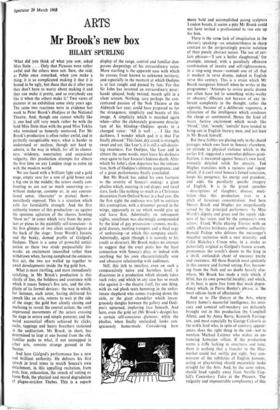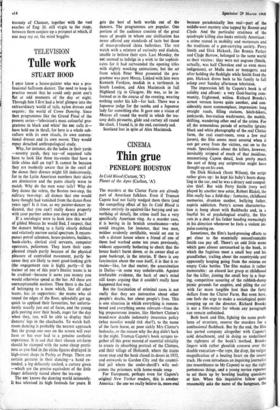Mr Brook's new box ARTS
HILARY SPURLING
'What did you think of what you saw, asked Miss Stein . . . Only that Picassos were rather awful and the others were not. Sure, she said, as Pablo once remarked, when you make a thing, it is so complicated making it that it is bound to be ugly, but those that do it after you they don't have to worry about making it and they can make it pretty, and so everybody can like it when the others make it.' Two views of pictures at an exhibition some sixty years ago. The same two reactions were in evidence last week to Peter Brook's Oedipus at the National Theatre. And, though one cannot wholly like it, one had still very much rather be with the bold Miss Stein than with the good Miss Toklas who remained so honestly unmoved. For Mr Brook's production is often rather awful, and in perfectly recognisable ways; what is harder to understand or analyse, though not hard to admire, is the way in which, for all its clumsi- ness, stridency, uncertainty and occasional vulgarity, this production attempts for almost the first time on any London stage to come up with the modern world.
We are faced with a brilliant light and a gold stage, empty save for a row of gold boxes and a big one in the middle; the actors stonily con- fronting us are not so much unnerving as— without make-up, costume or, in any conven- tional sense, 'character' to protect them— mercilessly exposed. This is a situation which calls for formidable strength. And the first authentic tremor of this production—as against the spurious agitation of the chorus, howling 'Show us!' in tones which vary from the petu- lant or pious to the painfully self-conscious—is lhe first glimpse of two silent seated figures at the back of the stage: Irene Worth's Jocasta and the beaky, domed profile of Gielgud's Oedipus. There is a sense of powerful antici- pation as these two stride purposefully for- wards; an excitement intensified rather than withdrawn when, having completed the ominous first act, the two are walled up together to await developments inside the big gold box.
What is most startling, and most immediately satisfying, in Mr Brook's production is this clarity of line, the boldness and assurance with which it traces Seneca's five acts, and the sim- plicity of its formal devices: the way in which, for instance, each actor, having delivered his speech like an aria, returns to wait at the side of the stage; the gold box silently closing and unclosing to reveal the central action; the swift impersonal movements of the actors crossing the stage in severe and simple patterns; and the weird accoustical effects achieved by clicks, sucks, tappings and heavy breathers stationed in the auditorium. Mr Brook, in short, has determined to leap at one bound from the old, familiar paths to what, if not unmapped in other arts, remains strange ground in the theatre.
And here Gielgud's performance has a new and brilliant authority. He delivers his first speech in level tones to match Seneca's own detachment, in this appalling recitation, from pain, fear, exhaustion, the stench of rotting or burnt flesh, the physical and moral degradation of Plague-stricken Thebes. This is a superb display of the range, control and familiar dan- gerous deepenings of his extraordinary voice. More startling is the apparent ease with which he crosses from known to unknown territory; and especially in the moment at which Oedipus is at last caught and pinned by fate. For this Sir John has invented an extraordinary pose: hands splayed, body twisted, mouth split in a silent scream. Nothing, save perhaps the con- centrated passion of the Noh Theatre at the Aldwych last year, could have prepared us for the strangeness, simplicity and beauty of this image. A simplicity which is matched again when—after the elaborately gruesome descrip- tion of his blinding—Oedipus speaks in a changed voice: 'All is well . . . I like this darkness, I wonder which god it is that I've finally pleased.' This faint, dry croak is strangely sweet and yet, like Lear's, it is still a self-deceiv- ing sweetness. For Oedipus, like Lear and in almost the same words, must leave his darkness once again to face Jocasta's hideous death. After which Sir John's slow departure has the exhaus- tion, both of Oedipus's ultimate acceptance, and of a great performance finally concluded.
But Mr Brook has added his own footnote to the severity of Seneca's ending: a giant phallus which, entering in red drapes and tinsel stars, looks like nothing so much as a Christmas decoration from Oxford Street in a bad year. On the first night the audience was left to outstare this contraption, with a drummer posted in the wings, apparently to see which would give up and leave first. Admittedly; on subsequent nights, anticlimax was charmingly compounded by the kind of gay procession—crowns, masks, gold dresses, tootling trumpets and a final orgy of undressing—at which this company excels. Admittedly, again (though it is scarcely to his credit as director), Mr Brook makes no attempt to suggest that the erect penis has the least connection with Seneca's play, or indeed with anything but his own characteristically sour and obsessive relationship with audiences.
Still, this itch to interfere, even on such a comparatively naïve and harmless level, is disastrous in a production which already takes such risks; and which in any case has so much else against it—the theatre itself, for one thing, with its red plush seats, hemming in the unfor- tunate shepherd who comes traipsing down the aisle, or the giant chandelier which incon- gruously dangles between the gallery and Oedi- pus's upturned, imploring face beneath. And here, even the gold set (Mr Brook's design) has a certain self-conscious glamour; while the phallus, when finally uncloaked, looks con- spicuously home-made. Considering how many bold and accomplished young sculptors London boasts, it seems a pity Mr Brook could not have invited a professional to run one up for him.
There is the sane lack of imagination in the chorus's speaking—an amateurishness in sharp contrast to the invigoratingly precise notation of their purely abstract noises. The use of cer- tain phrases-1 saw a heifer slaughtered,' for example, intoned, with a peculiarly offensive combination of inanity and self-righteousness, in a sing-song moan—reminds one of all that is weakest in verse drama, indeed in English verse this century. This is a strain which Mr Brook recognises himself when he writes in the programme: 'Attempts to revive poetic drama too often have led to something wishy-washy or obscure.' Obscure not because of any in- herent complexity in the thought, rather the opposite, because of a deliberate vagueness, a relaxation of the intelligence which condones the cheap or sentimental. Hence the kind of moist, furtive excitement which words like 'blood,' 'clot,' womb,"entrails' have tended to bring out in English literary men, and not least in Mr Brook himself.
But these foibles are glaring only in the choral passages which owe least to Seneca; elsewhere, an attitude to physical violence which, in the earlier US, suggested a somewhat dubious grati- fication, is measured against Seneca's own hard, minutely detailed relish for atrocity. Ted Hughes translates with a raciness and vigour which, if it can't rival Seneca's famed concision, keeps his pungency, his energy and grandeur, and adds the peculiarly specific imagery of English. It is in the grand speeches —descriptions of slaughter, disease, muti- lation—that this production rises to a pitch of ferocious concentration. And here Messrs Brook and Hughes are magnificently served by the principal performers—by Miss Worth's dignity and grace and the supple rich- ness of her voice, and by the company's own actors: Frank Wylie playing Tiresias with an oddly effective briskness and sombre authority; Ronald Pickup who delivers the messenger's macabre recitation with a rare intensity; and Colin Blakeley's Creon who, in a stroke as powerfully original as Gielgud's frozen scream, pronounces the oracle's doom to the king in a shrill, outlandish chant of uncanny purity and sweetness. All these flourish most opulently in this austere and formal setting. For, borrow- ing from the Noh and no doubt heavily else- where, Mr Brook has made a style which, if fitful, has its own powerful lucidity; and which, at its best, is quite free from that weak depen- dancy which, in Pierre Boulez's phrase, is 'the most odious form of affectation.'
And so to The Outcry at the Arts, where Henry James's masterful intelligence, his intri- cacy and comical self-mockery are delicately brought out in this production (by Campbell Allen), and by Anna Barry, Kenneth Farring- ton, and most especially by George Colouris as the noble lord who, in spite of contrary appear- ances, does the right thing in the end—not to mention Michael Latimer who makes an en- trancing Jamesian villain. If the production seems a trifle lacking in smartness and tone, there is nothing that a transfer to the Hay- market could not swiftly put right. Any con- noisseur of the subtleties of English humour, acting or playwrirting should meanwhile make straight for the Arts. And, by the same token, should head rapidly away from Neville Cog- hill's Canterbury Tales at the Phoenix. The vulgarity and impenetrable complacency of this
travesty of Chaucer, together with the vast reaches of Eng. lit. still virgin to the stage, between them conjure up a prospect at which, if one may say so, the mind boggles.







































 Previous page
Previous page